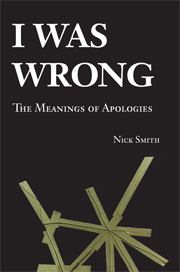Book contents
- Frontmatter
- Contents
- Acknowledgments
- Introduction: Apologies as a Source of Moral Meaning in Modernity
- Part One Apologies from Individuals
- 1 The Meanings of Apologies
- 2 Elements of the Categorical Apology
- 3 Apologies and Gender
- 4 Apologies in Diverse Religious and Cultural Traditions
- 5 Unusual Cases: Apologizing to Animals, Infants, Machines, the Deceased, and Yourself
- 6 The Relationship between Apologies and Forgiveness
- 7 Varieties of Apologies
- Part Two Collective Apologies
- Conclusion: Previewing the Meanings of Apologies in Law
- Notes
- Index
4 - Apologies in Diverse Religious and Cultural Traditions
Published online by Cambridge University Press: 07 December 2009
- Frontmatter
- Contents
- Acknowledgments
- Introduction: Apologies as a Source of Moral Meaning in Modernity
- Part One Apologies from Individuals
- 1 The Meanings of Apologies
- 2 Elements of the Categorical Apology
- 3 Apologies and Gender
- 4 Apologies in Diverse Religious and Cultural Traditions
- 5 Unusual Cases: Apologizing to Animals, Infants, Machines, the Deceased, and Yourself
- 6 The Relationship between Apologies and Forgiveness
- 7 Varieties of Apologies
- Part Two Collective Apologies
- Conclusion: Previewing the Meanings of Apologies in Law
- Notes
- Index
Summary
We can trace much of the meaning attributed to apologies in modern life to archaic religious and cultural practices associated with repentance. Consider Jeffrie Murphy's definition of repentance as the “remorseful acceptance of responsibility for one's wrongful and harmful actions, the repudiation of the aspects of one's character that generated the actions, the resolve to do one's best to extirpate those aspects of one's character, and the resolve to atone or make amends for the harm that one has done.” Indeed, this might well serve as an abbreviated definition of a robust apology. I can thankfully leave the detailed work of analyzing these traditions to others, but we can notice here how the broad contours of several of the major traditions of repentance share features with each other and how contemporary secular notions of apologies map onto these beliefs. We can also observe where these conventions resist translation into pluralistic discourse and create dissonance between those operating with opposing belief systems. The dilution of repentance into apology may partially account for our sense of the weakness of so many gestures of contrition.
Before discussing the specific traditions, several general observations seem noteworthy. First, religious rituals of repentance are explicitly moral acts. We commonly understand repentance not as a mere social necessity, but rather as an act of faith and form of communion with one's god. Within religious traditions, repentance affirms the sinner's ultimate values and invokes her basic understanding of the meaning and purpose of life.
- Type
- Chapter
- Information
- I Was WrongThe Meanings of Apologies, pp. 114 - 125Publisher: Cambridge University PressPrint publication year: 2008



